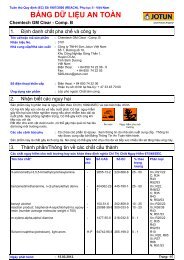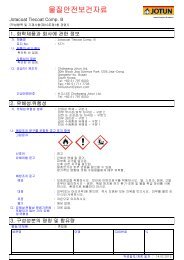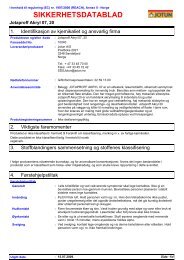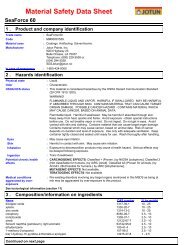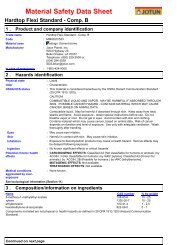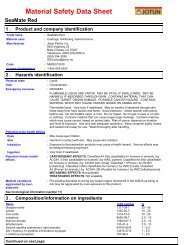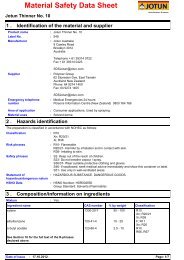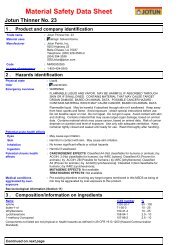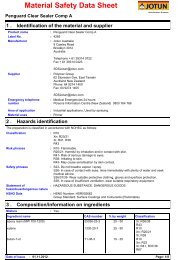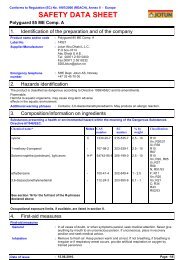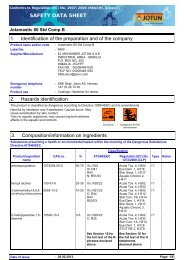PVA Primer - Jotun
PVA Primer - Jotun
PVA Primer - Jotun
Create successful ePaper yourself
Turn your PDF publications into a flip-book with our unique Google optimized e-Paper software.
<strong>PVA</strong> <strong>Primer</strong>4.First-aid measuresGeneralInhalationSkin contactEye contactIngestion5.First-aid measuresFire-fighting measuresExtinguishing media :Extinguishing media not tobe usedRecommendations:::::In all cases of doubt, or when symptoms persist, seek medical attention. Never giveanything by mouth to an unconscious person. If unconscious, place in recoveryposition and seek medical advice.Remove to fresh air. Keep person warm and at rest. If not breathing, if breathing isirregular or if respiratory arrest occurs, provide artificial respiration or oxygen bytrained personnel.Remove contaminated clothing and shoes. Wash skin thoroughly with soap andwater or use recognised skin cleanser. Do NOT use solvents or thinners.Check for and remove any contact lenses. Immediately flush eyes with running waterfor at least 15 minutes, keeping eyelids open. Seek immediate medical attention.If swallowed, seek medical advice immediately and show the container or label.Keep person warm and at rest. Do not induce vomiting.Recommended: alcohol-resistant foam, CO2, powders, water spray.: Do not use water jet.6. Accidental release measuresPersonal precautionsSpill: Fire will produce dense black smoke. Exposure to decomposition products maycause a health hazard. Appropriate breathing apparatus may be required.Cool closed containers exposed to fire with water. Do not release runoff from fire todrains or watercourses.::Exclude sources of ignition and ventilate the area. Avoid breathing vapour or mist.Refer to protective measures listed in sections 7 and 8.Contain and collect spillage with non-combustible, absorbent material e.g. sand,earth, vermiculite or diatomaceous earth and place in container for disposalaccording to local regulations (see section 13). Preferably clean with a detergent.Avoid using solvents.Note: see section 8 for personal protective equipment and section 13 for waste disposal.7.HandlingHandling and storage:Prevent the creation of flammable or explosive concentrations of vapours in air andavoid vapour concentrations higher than the occupational exposure limits.In addition, the product should only be used in areas from which all naked lights andother sources of ignition have been excluded. Electrical equipment should beprotected to the appropriate standard.To dissipate static electricity during transfer, earth drum and connect to receivingcontainer with bonding strap. Operators should wear antistatic footwear and clothingand floors should be of the conducting type.Keep away from heat, sparks and flame. No sparking tools should be used.Avoid contact with skin and eyes. Avoid the inhalation of dust, particulates, spray ormist arising from the application of this preparation. Avoid inhalation of dust fromsanding.Eating, drinking and smoking should be prohibited in areas where this material ishandled, stored and processed.Put on appropriate personal protective equipment (see Section 8).Never use pressure to empty. Container is not a pressure vessel.Always keep in containers made from the same material as the original one.Comply with the health and safety at work laws.Information on fire and explosion protectionVapours are heavier than air and may spread along floors. Vapours may formexplosive mixtures with air.When operators, whether spraying or not, have to work inside the spray booth,ventilation is unlikely to be sufficient to control particulates and solvent vapour in allcases. In such circumstances they should wear a compressed air-fed respiratorduring the spraying process and until such time as the particulates and solventvapour concentration has fallen below the exposure limits.Date of issue : 09.02.2011.Page: 2/5



